Digital access and skills are a critical component of modern life. In 2023, The Arc and Comcast teamed up to help people with intellectual and developmental disabilities (IDD) leverage technology to open the door to new experiences in their communities.
The Arc and Comcast have a long-standing partnership to do this work. The Arc’s national network of nearly 600 chapters provides vital resources and services to individuals with IDD and their families to promote greater independence and opportunity in the community—and through this partnership, since 2017, more than 3,000 clients have received basic digital skills training.
The program continues to expand what’s possible for people with IDD in their professional and personal lives—giving them the tools to chart their own course, just like we all want to do.
Meet Kris, a 59-year-old man with cerebral palsy.
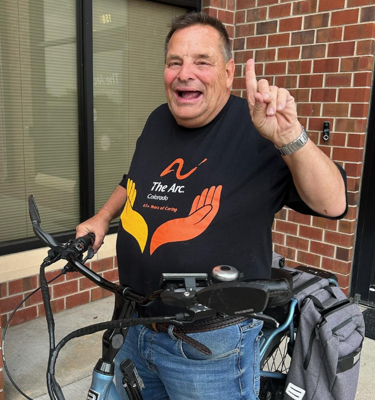 Kris lives with his sister’s family in his hometown of Greely, Colorado, and has been successfully employed for 40 years, currently working full time at the busiest grocery store in town. He is an avid sports fan—Go Bears!—has a busy social life, and because of his gregarious personality he is a bit of a local celebrity, traveling around town on his e-bike. Kris has become very active in civic service—involved with the Chamber of Commerce, volunteering at local nonprofits, and serving in leadership roles at both The Arc of Weld County and on The Arc’s National Council of Self-Advocates.
Kris lives with his sister’s family in his hometown of Greely, Colorado, and has been successfully employed for 40 years, currently working full time at the busiest grocery store in town. He is an avid sports fan—Go Bears!—has a busy social life, and because of his gregarious personality he is a bit of a local celebrity, traveling around town on his e-bike. Kris has become very active in civic service—involved with the Chamber of Commerce, volunteering at local nonprofits, and serving in leadership roles at both The Arc of Weld County and on The Arc’s National Council of Self-Advocates.
To be effective in his new roles, Kris had to better leverage modern technology and communication platforms. He was comfortable with the basic use of his cell phone and his laptop, and The Arc of Weld County provided tech coaching to give him the confidence with the more advanced technology he needed to be successful. Kris learned how to navigate complex websites with multiple drop-down navigation structures and use passwords to access secure portals. His tech coaches showed him how to sync his calendars and email on both devices to stay on top of his busy schedule. He has even mastered accessing virtual meetings. After a long day, his eyes get tired and email can become stressful, so Kris taught himself how to use the read aloud feature to make it easier.
Kris continues to get weekly tech coaching sessions to keep advancing his skills. He is learning to use folders to organize his documents, better managing calendar invites, learning tactics to ensure he is responsive, and understanding how to identify and handle junk or malicious email. Like many of us, passwords and computer updates can still “throw him for a loop” from time to time, but he stays patient, and as he says, “It feels good when you figure something out.”
By advancing his technology skills, Kris has been able to pursue work that he feels is incredibly important. He shares his lived experience as a person with IDD while counseling disability organizations at the local, state, and national level on how to better support people with disabilities. “I know what it feels like to feel like you are not heard. I want to help people be heard.”
Meet Roselyn, a 60-year-old woman with Down syndrome.
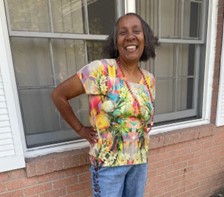 Roselyn has lived with her mother and received support from The Arc of Greater Indianapolis since 1981. During the week, Roselyn works at Corteva Agriscience through The Arc of Greater Indianapolis’ employment services. She works as part of a team that assists scientists in preparing seedling trays for growing new plants, hosing down trays when experiments are complete, and keeping the greenhouse labs clean. Roselyn is very proud of her work and the independence she has from earning a paycheck. She recently bought a kitchen table set and used her tax check to buy a new washer and dryer.
Roselyn has lived with her mother and received support from The Arc of Greater Indianapolis since 1981. During the week, Roselyn works at Corteva Agriscience through The Arc of Greater Indianapolis’ employment services. She works as part of a team that assists scientists in preparing seedling trays for growing new plants, hosing down trays when experiments are complete, and keeping the greenhouse labs clean. Roselyn is very proud of her work and the independence she has from earning a paycheck. She recently bought a kitchen table set and used her tax check to buy a new washer and dryer.
However, when her mom had to be moved into a nursing home quite abruptly, Roselyn needed an emergency placement. The Arc of Greater Indianapolis helped move her into a new living environment with staff support. Roselyn enjoys the financial independence that comes with working—for example, she has a standing hair appointment every two weeks for some pampering at the salon. With more activities in the community, Roselyn started wanting to enjoy some alone time without staff having to be with her. This was going to require some tech coaching to do so safely.
Roselyn had used cell phones over the years, but she never really explored the features they offered and would either lose or break them. If she wanted to call family, staff would have to help her. Staff at The Arc of Greater Indianapolis worked with Roselyn regularly for a couple of months as part of these tech coaching sessions. They helped her learn how to call and text family, friends, and staff and how to contact help if she ever feels unsafe. She has learned how to access the internet and use apps like Voice to Text to look things up and connect with friends. Now, she gets time to herself each day. Roselyn gets home from work around 1:30, but her staff don’t arrive until 3:30. She either calls or texts them, though, to let them know that she made it home safely. Then she spends some time searching for videos on dogs and cats (she loves showing these to her staff later) as well as watching her favorite shows online (she especially loves Night Court and Law & Order). If the weather is bad on Sundays, Roselyn even watches church online. When she’s not working or using her phone, she likes doing 5,000-piece puzzles, going shopping, and seeing her Colts or Pacers play.
Through tech coaching, Roselyn has achieved a newfound sense of independence. You never fully appreciate how nice it sometimes is to be alone if you’ve never been able to experience it. Roselyn loves her work, friends, family, and the staff who work with her. However, sometimes it’s wonderful to just spend some time alone.
“When we provide access to digital skills training, we create opportunities and pathways to independence that can be life-changing, especially for those living with disabilities,” said Dalila Wilson-Scott, Executive Vice President and Chief Diversity Officer of Comcast Corporation. “Partnerships, like the one we’re proud to share with The Arc, are at the heart of what drives us each day at Comcast because of the many lives we’re able to help impact. We’re so very honored to continue to grow our work together and help enrich even more lives.”
Comcast’s partnership with The Arc is part of Project UP, the company’s comprehensive initiative to address digital inequities and help build a future of unlimited possibilities. Backed by a $1 billion commitment to reach tens of millions of people, Project UP is focused on connecting people to the Internet, advancing economic mobility, and opening doors for the next generation of innovators, entrepreneurs, storytellers, and creators.

 Charlotte is an advocate with Down syndrome who was born with a congenital heart defect. She had to undergo multiple surgeries as a child and finally received a heart transplant in 2012. The journey to get her heart transplant had its challenges, but she used her experience to fight to make sure everyone had access to organ transplants. To make this a reality, Charlotte spoke with policymakers about creating a bill about organ transplant discrimination. Members of Congress created the Charlotte Woodward Organ Transplant Discrimination Prevention Act. This bill would prohibit health care entities from denying a person access to a transplant due to their disability.
Charlotte is an advocate with Down syndrome who was born with a congenital heart defect. She had to undergo multiple surgeries as a child and finally received a heart transplant in 2012. The journey to get her heart transplant had its challenges, but she used her experience to fight to make sure everyone had access to organ transplants. To make this a reality, Charlotte spoke with policymakers about creating a bill about organ transplant discrimination. Members of Congress created the Charlotte Woodward Organ Transplant Discrimination Prevention Act. This bill would prohibit health care entities from denying a person access to a transplant due to their disability.



 That perseverance continues to propel Lawrence to chase his dreams, powering him through twice daily swim sessions plus lifting when he’s at school and daily 4:30 am swims during breaks. “I have goals that I want to reach, and I just focus on my goals and what I need to do to achieve those goals,” he says of how he stays focused. His pre-meet routine of eating sandwiches and spaghetti helps him fuel up.
That perseverance continues to propel Lawrence to chase his dreams, powering him through twice daily swim sessions plus lifting when he’s at school and daily 4:30 am swims during breaks. “I have goals that I want to reach, and I just focus on my goals and what I need to do to achieve those goals,” he says of how he stays focused. His pre-meet routine of eating sandwiches and spaghetti helps him fuel up. Beyond the pool, Lawrence hopes his story will shatter misconceptions about people with disabilities and their potential. “They think that we are happy with letting people do things for us and telling us what to do,” he says of societal attitudes toward autism and intellectual disabilities. “They don’t think that we are capable of making decisions for ourselves and can do things independently.” Lawrence also plans to “graduate from college in 2025, get a job doing something I love, and one day have my own home.”
Beyond the pool, Lawrence hopes his story will shatter misconceptions about people with disabilities and their potential. “They think that we are happy with letting people do things for us and telling us what to do,” he says of societal attitudes toward autism and intellectual disabilities. “They don’t think that we are capable of making decisions for ourselves and can do things independently.” Lawrence also plans to “graduate from college in 2025, get a job doing something I love, and one day have my own home.”
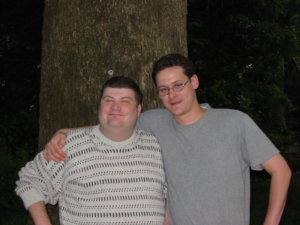 Family is at the heart of Burt Hudson’s connection to The Arc.
Family is at the heart of Burt Hudson’s connection to The Arc. Jack is now 9 years old and—despite a speech delay from childhood apraxia of speech—he is a complex, smart, and kind third grader. He loves riding horses, dancing to Bruno Mars and Maroon 5, drumming, and acting out Muppets movies. He also has a 6-year-old younger brother, James, and “They have been a duo ever since James was born.” Burt recalls a memory from his childhood when he and his brother were wrestling in the ocean, showing John was just another sibling. The same camaraderie is seen between Jack and James.
Jack is now 9 years old and—despite a speech delay from childhood apraxia of speech—he is a complex, smart, and kind third grader. He loves riding horses, dancing to Bruno Mars and Maroon 5, drumming, and acting out Muppets movies. He also has a 6-year-old younger brother, James, and “They have been a duo ever since James was born.” Burt recalls a memory from his childhood when he and his brother were wrestling in the ocean, showing John was just another sibling. The same camaraderie is seen between Jack and James.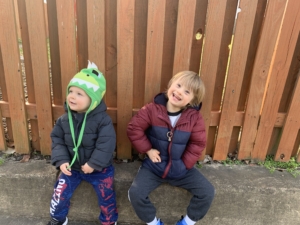
 Burt wants people with disabilities and their loved ones to know they can always turn to The Arc for guidance. “The Arc is a wonderful resource full of wonderful people, one that generations of families have relied on to find the path they need to be walking.” As Treasurer of our national Board, Burt is heartened to see The Arc remain strong through the decades. “There’s a lack of compassion and a lack of love all around us, and The Arc is the heart of this country. It shows the strength we have when we’re banded together with a common cause and love for each other. The consistent light The Arc has provided gives me comfort and hope that we’ll get through anything.”
Burt wants people with disabilities and their loved ones to know they can always turn to The Arc for guidance. “The Arc is a wonderful resource full of wonderful people, one that generations of families have relied on to find the path they need to be walking.” As Treasurer of our national Board, Burt is heartened to see The Arc remain strong through the decades. “There’s a lack of compassion and a lack of love all around us, and The Arc is the heart of this country. It shows the strength we have when we’re banded together with a common cause and love for each other. The consistent light The Arc has provided gives me comfort and hope that we’ll get through anything.”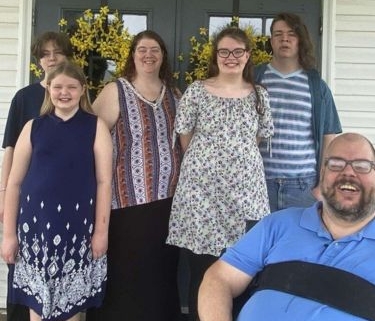
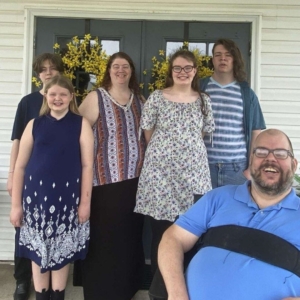 This Father’s Day, we’re celebrating Mike, a dad whose unconditional love and devotion are redefining society’s views on parenthood. Born with cerebral palsy, Mike has navigated life from a wheelchair, facing prejudices that often wrongly question the ability of those with disabilities to raise children.
This Father’s Day, we’re celebrating Mike, a dad whose unconditional love and devotion are redefining society’s views on parenthood. Born with cerebral palsy, Mike has navigated life from a wheelchair, facing prejudices that often wrongly question the ability of those with disabilities to raise children. His disability has no impact on his ability to empower his children’s pursuit of interests and passions, from sports to church activities. He also teaches life skills and moral values to youth as a deacon and youth counselor at his church and a coach for Junior Church. His ultimate advice to other parents with disabilities? “God chose you to raise this child – you can do it! Keep working at it and don’t give up.” His oldest is already planning for his future, with his sights set on graphics design or counseling.
His disability has no impact on his ability to empower his children’s pursuit of interests and passions, from sports to church activities. He also teaches life skills and moral values to youth as a deacon and youth counselor at his church and a coach for Junior Church. His ultimate advice to other parents with disabilities? “God chose you to raise this child – you can do it! Keep working at it and don’t give up.” His oldest is already planning for his future, with his sights set on graphics design or counseling.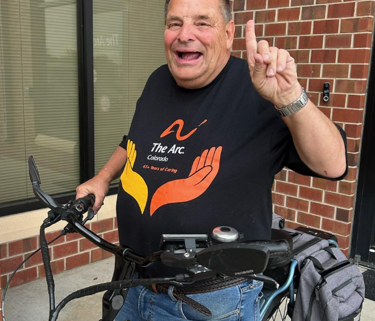
 Kris lives with his sister’s family in his hometown of Greely, Colorado, and has been successfully employed for 40 years, currently working full time at the busiest grocery store in town. He is an avid sports fan—Go Bears!—has a busy social life, and because of his gregarious personality he is a bit of a local celebrity, traveling around town on his e-bike. Kris has become very active in civic service—involved with the Chamber of Commerce, volunteering at local nonprofits, and serving in leadership roles at both The Arc of Weld County and on The Arc’s National Council of Self-Advocates.
Kris lives with his sister’s family in his hometown of Greely, Colorado, and has been successfully employed for 40 years, currently working full time at the busiest grocery store in town. He is an avid sports fan—Go Bears!—has a busy social life, and because of his gregarious personality he is a bit of a local celebrity, traveling around town on his e-bike. Kris has become very active in civic service—involved with the Chamber of Commerce, volunteering at local nonprofits, and serving in leadership roles at both The Arc of Weld County and on The Arc’s National Council of Self-Advocates. Roselyn has lived with her mother and received support from The Arc of Greater Indianapolis since 1981. During the week, Roselyn works at Corteva Agriscience through The Arc of Greater Indianapolis’ employment services. She works as part of a team that assists scientists in preparing seedling trays for growing new plants, hosing down trays when experiments are complete, and keeping the greenhouse labs clean. Roselyn is very proud of her work and the independence she has from earning a paycheck. She recently bought a kitchen table set and used her tax check to buy a new washer and dryer.
Roselyn has lived with her mother and received support from The Arc of Greater Indianapolis since 1981. During the week, Roselyn works at Corteva Agriscience through The Arc of Greater Indianapolis’ employment services. She works as part of a team that assists scientists in preparing seedling trays for growing new plants, hosing down trays when experiments are complete, and keeping the greenhouse labs clean. Roselyn is very proud of her work and the independence she has from earning a paycheck. She recently bought a kitchen table set and used her tax check to buy a new washer and dryer.
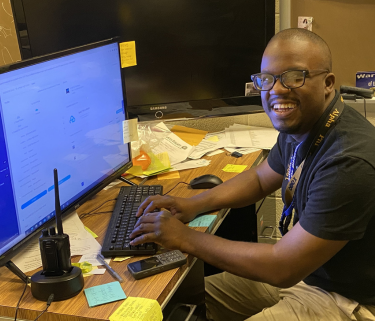
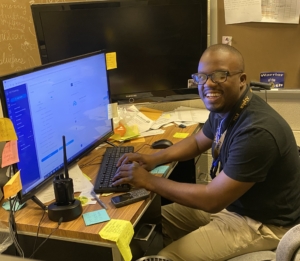 Tayone Miller is a full-time Computer Analyst with Charles County Public Schools (CCPS), bringing nearly a decade of experience in developing, managing, and improving information technology. It’s a career he’s always dreamed of. “Technology helps people throughout their lives,” he shares. “I wanted a career that would be everlasting, and Computer Information Systems (CIS) was the right fit for me.”
Tayone Miller is a full-time Computer Analyst with Charles County Public Schools (CCPS), bringing nearly a decade of experience in developing, managing, and improving information technology. It’s a career he’s always dreamed of. “Technology helps people throughout their lives,” he shares. “I wanted a career that would be everlasting, and Computer Information Systems (CIS) was the right fit for me.”





